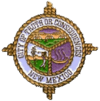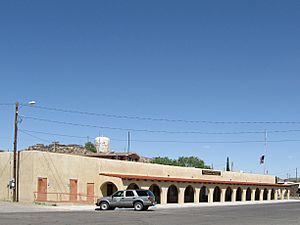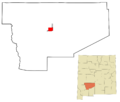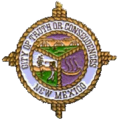Truth or Consequences, New Mexico facts for kids
Quick facts for kids
Truth or Consequences, New Mexico
|
||
|---|---|---|
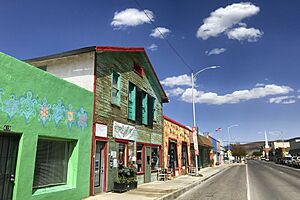
Broadway, Truth or Consequences
|
||
|
||
| Nickname(s):
"T or C"
|
||
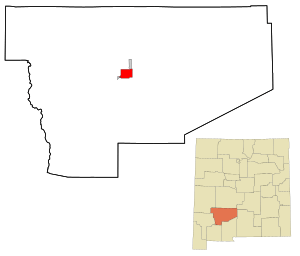
Location of Truth or Consequences, New Mexico
|
||
| Country | United States | |
| State | New Mexico | |
| County | Sierra | |
| Named for | Truth or Consequences radio show | |
| Area | ||
| • Total | 28.11 sq mi (72.81 km2) | |
| • Land | 28.00 sq mi (72.51 km2) | |
| • Water | 0.12 sq mi (0.30 km2) | |
| Elevation | 4,311 ft (1,314 m) | |
| Population
(2020)
|
||
| • Total | 6,052 | |
| • Density | 216.17/sq mi (83.47/km2) | |
| Time zone | UTC−07:00 (Mountain (MST)) | |
| • Summer (DST) | UTC−06:00 (MDT) | |
| ZIP Code |
87901
|
|
| Area code(s) | 575 | |
| FIPS code | 35-79840 | |
| GNIS feature ID | 2412102 | |
Truth or Consequences (often called T or C) is a city in New Mexico, a state in the United States. It is the main city of Sierra County. In 2020, about 6,052 people lived there. The city was once called Hot Springs. It changed its name in 1950 because of a popular radio show. This makes it one of the places with a very unusual name!
Contents
History of Truth or Consequences
This area is famous for its natural hot springs. The first public bath was built here in the late 1800s. It was located over Geronimo Springs. The hot springs are part of a larger system called the Hot Springs Artesian Basin.
How Elephant Butte Dam Shaped the City
The city really started to grow after the Elephant Butte Dam was built. Construction began in 1912 and finished in 1916. This dam created a huge lake called Elephant Butte Reservoir. It was part of a big plan to bring water for farming. In 1916, the town officially became Hot Springs. It became the county seat for Sierra County in 1937. By the late 1930s, Hot Springs had about 40 different hot spring spas. Many visitors came to enjoy them.
Why Did Hot Springs Change Its Name?
The city changed its name because of a fun radio show contest. In March 1950, Ralph Edwards, the host of the Truth or Consequences radio show, made an offer. He said he would broadcast his show's 10th anniversary from the first town that renamed itself after the show. Hot Springs quickly changed its name on March 31, 1950. The show was then broadcast from the city the very next night!
Ralph Edwards visited the town every year for 50 years after that. This special event became known as Fiesta. It grew to include a beauty contest, a parade, and a stage show. The city still celebrates Fiesta every year during the first weekend of May. The parade often features local leaders and beauty queens. Fiesta also includes a dance in Ralph Edwards Park.
Exploring the Hot Springs Today
Truth or Consequences still has many hot springs. A lot of hot water flows from these springs every second. Before World War II, there were around 40 hot spring spas. By 2008, ten spas were part of the Hot Springs Association. Some get water from wells, while others use naturally flowing springs.
In the 1980s, the New Mexico government used geothermal energy here. This is energy from the Earth's heat. For example, the local Senior Citizen's Center uses a geothermal heating system.
Geography and Location
Truth or Consequences covers about 12.8 square miles (33.2 square kilometers). Most of this area is land, with a small part being water.
The city is located right on the Rio Grande river. It is also very close to the large Elephant Butte Reservoir. The city has its own airport, the Truth or Consequences Municipal Airport. Major roads like Interstate 25 also serve the city.
Understanding the Climate
Truth or Consequences has a cool desert climate. This means it is generally dry. There are three main seasons. From April to June, it's very dry and hot during the day. Nights are much cooler. In July, the monsoon season begins. It stays hot, but it's more humid. Thunderstorms bring frequent rain.
The winter season, from October to March, has nice mild and sunny days. Nights are cold. Sometimes, it rains a little. On average, the city has about 88 days a year where the temperature goes above 90°F (32°C). About 20 days reach over 100°F (38°C). Snow is rare here.
| Climate data for Truth or Consequences, New Mexico (Elephant Butte Dam), 1991–2020 normals, extremes 1908–present | |||||||||||||
|---|---|---|---|---|---|---|---|---|---|---|---|---|---|
| Month | Jan | Feb | Mar | Apr | May | Jun | Jul | Aug | Sep | Oct | Nov | Dec | Year |
| Record high °F (°C) | 78 (26) |
83 (28) |
89 (32) |
96 (36) |
103 (39) |
111 (44) |
110 (43) |
106 (41) |
102 (39) |
98 (37) |
88 (31) |
78 (26) |
111 (44) |
| Mean maximum °F (°C) | 68.4 (20.2) |
74.4 (23.6) |
81.9 (27.7) |
88.8 (31.6) |
95.9 (35.5) |
104.3 (40.2) |
103.8 (39.9) |
100.6 (38.1) |
95.8 (35.4) |
89.3 (31.8) |
77.9 (25.5) |
68.1 (20.1) |
105.7 (40.9) |
| Mean daily maximum °F (°C) | 56.5 (13.6) |
62.0 (16.7) |
69.4 (20.8) |
77.5 (25.3) |
86.2 (30.1) |
95.9 (35.5) |
95.7 (35.4) |
93.3 (34.1) |
87.6 (30.9) |
78.0 (25.6) |
65.6 (18.7) |
55.6 (13.1) |
76.9 (25.0) |
| Daily mean °F (°C) | 43.3 (6.3) |
48.1 (8.9) |
54.9 (12.7) |
63.0 (17.2) |
71.9 (22.2) |
81.7 (27.6) |
82.9 (28.3) |
80.9 (27.2) |
74.7 (23.7) |
64.1 (17.8) |
52.0 (11.1) |
43.0 (6.1) |
63.4 (17.4) |
| Mean daily minimum °F (°C) | 30.0 (−1.1) |
34.1 (1.2) |
40.3 (4.6) |
48.5 (9.2) |
57.6 (14.2) |
67.4 (19.7) |
70.2 (21.2) |
68.6 (20.3) |
61.9 (16.6) |
50.3 (10.2) |
38.4 (3.6) |
30.4 (−0.9) |
49.8 (9.9) |
| Mean minimum °F (°C) | 20.2 (−6.6) |
23.0 (−5.0) |
27.9 (−2.3) |
36.3 (2.4) |
44.1 (6.7) |
57.1 (13.9) |
63.3 (17.4) |
62.1 (16.7) |
52.8 (11.6) |
37.1 (2.8) |
25.9 (−3.4) |
18.7 (−7.4) |
16.1 (−8.8) |
| Record low °F (°C) | −7 (−22) |
−2 (−19) |
14 (−10) |
23 (−5) |
33 (1) |
39 (4) |
51 (11) |
51 (11) |
37 (3) |
22 (−6) |
9 (−13) |
−3 (−19) |
−7 (−22) |
| Average precipitation inches (mm) | 0.42 (11) |
0.33 (8.4) |
0.26 (6.6) |
0.28 (7.1) |
0.43 (11) |
0.48 (12) |
2.17 (55) |
1.81 (46) |
1.58 (40) |
0.87 (22) |
0.62 (16) |
0.64 (16) |
9.89 (251.1) |
| Average snowfall inches (cm) | 0.2 (0.51) |
0.3 (0.76) |
0.0 (0.0) |
0.0 (0.0) |
0.0 (0.0) |
0.0 (0.0) |
0.0 (0.0) |
0.0 (0.0) |
0.0 (0.0) |
0.1 (0.25) |
0.0 (0.0) |
0.3 (0.76) |
0.9 (2.28) |
| Average precipitation days (≥ 0.01 in) | 3.0 | 2.2 | 2.3 | 1.3 | 2.4 | 2.7 | 7.7 | 8.2 | 5.7 | 4.2 | 2.6 | 3.1 | 45.4 |
| Average snowy days (≥ 0.1 in) | 0.2 | 0.1 | 0.0 | 0.0 | 0.0 | 0.0 | 0.0 | 0.0 | 0.0 | 0.1 | 0.0 | 0.1 | 0.5 |
| Source 1: NOAA | |||||||||||||
| Source 2: National Weather Service | |||||||||||||
People and Population
| Historical population | |||
|---|---|---|---|
| Census | Pop. | %± | |
| 1920 | 455 | — | |
| 1930 | 1,336 | 193.6% | |
| 1940 | 2,940 | 120.1% | |
| 1950 | 4,700 | 59.9% | |
| 1960 | 5,000 | 6.4% | |
| 1970 | 4,656 | −6.9% | |
| 1980 | 5,219 | 12.1% | |
| 1990 | 6,221 | 19.2% | |
| 2000 | 7,289 | 17.2% | |
| 2010 | 6,475 | −11.2% | |
| 2020 | 6,052 | −6.5% | |
| U.S. Decennial Census | |||
In 2000, there were 7,289 people living in Truth or Consequences. There were 3,450 households, and 1,859 families. The population density was about 576 people per square mile.
Most people in the city were White (85.35%). About 27.4% of the population was Hispanic or Latino.
About 20.2% of households had children under 18. Many households (40.5%) were married couples. The average household had 2.04 people. The average family had 2.75 people.
The median age in the city was 48 years old. This means half the people were older than 48, and half were younger. About 29.3% of the people were 65 or older. The median income for a household was $20,986. This means half of the households earned more than this, and half earned less.
Education in Truth or Consequences
The Truth or Consequences Schools district serves the entire county. There are two elementary schools: Sierra Elementary Complex and Truth or Consequences Elementary School. For older students, there is Truth or Consequences Middle School. The high school is Hot Springs High School. Both are located in Truth or Consequences.
Arts and Culture
The Sierra County Arts Council helps support art and culture in the area. They organize public talks and events. They also sponsor murals and performances.
Truth or Consequences is home to several art galleries. These include The Center Gallery and Xochi's Bookstore and Gallery. Even though it's far from Santa Fe, the town is known as an art center in New Mexico. It has a regular "Art Hop" event. This event takes place around Main Street and the historic hot springs area.
A movie called Truth or Consequences, N.M. was made in 1997. It was directed by and starred Kiefer Sutherland.
Images for kids
See also
 In Spanish: Truth or Consequences para niños
In Spanish: Truth or Consequences para niños
 | William Lucy |
 | Charles Hayes |
 | Cleveland Robinson |


